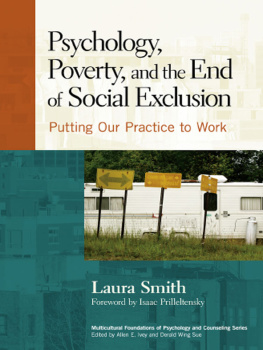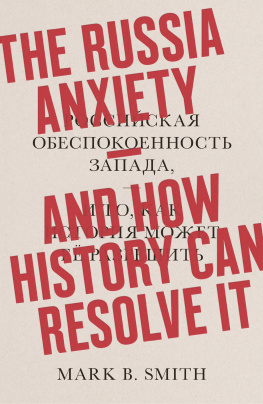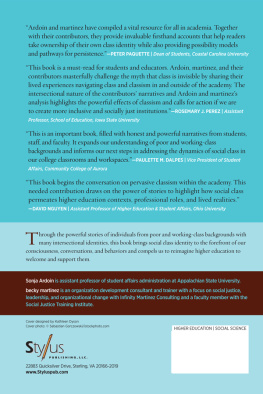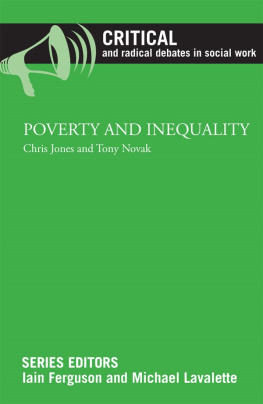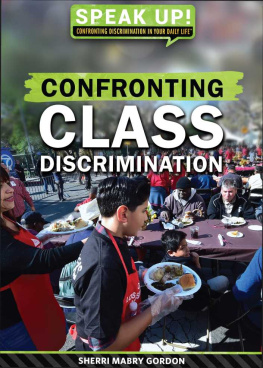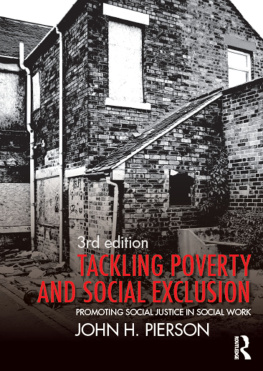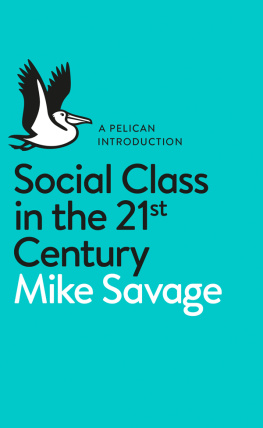Series Editors: Allen E. Ivey and Derald Wing Sue
Psychology, Poverty, and the End of Social Exclusion: Putting Our Practice to Work
Madonna G. Constantine
Healing the Soul Wound: Counseling with American Indians and Other Native Peoples
Counseling and Psychotherapy with Arabs and Muslims: A Culturally Sensitive Approach
Learning from My Mothers Voice: Family Legend and the Chinese American Experience
Community Genograms: Using Individual, Family, and Cultural Narratives with Clients
Sandra A. Rigazio-DiGilio, Allen E. Ivey, Kara P. Kunkler-Peck, and Lois T. Grady
PSYCHOLOGY, POVERTY, AND THE END OF SOCIAL EXCLUSION
Putting Our Practice to Work
Laura Smith
Foreword by Isaac Prilleltensky

Teachers College, Columbia University
New York and London
Published by Teachers College Press, 1234 Amsterdam Avenue, New York, NY 10027
Copyright 2010 by Teachers College, Columbia University
All rights reserved. No part of this publication may be reproduced or transmitted in any form or by any means, electronic or mechanical, including photocopy, or any information storage and retrieval system, without permission from the publisher.
Passages within this book have been adapted from my previous work, and I gratefully acknowledge the permission granted for their use by the original publishers.
Published by the American Psychological Association:
Smith, L. (2005). Classism, psychotherapy, and the poor: Conspicuous by their absence. American Psychologist , 60(7), 687-696.
Smith, L. (2009). Enhancing training and practice in the context of poverty. Training and Education in Professional Psychology, 3, 84-93.
Smith, L., Chambers, D. A., & Bratini, L. (2009). When oppression is the pathogen: The participatory development of socially just mental health practice. American Journal of Orthopsychiatry, 79, 159-168.
Published by Sage/Society:
Smith, L. (2008). Positioning classism within psychologys social justice agenda. The Counseling Psychologist, 36, 895-924.
Library of Congress Cataloging-in-Publication Data
Smith, Laura, 1960
Psychology, poverty, and the end of social exclusion: putting our practice to work / Laura Smith; foreword by Prilleltensky.
p. cm. (Multicultural Foundations of Psychology and Counseling Series)
Includes bibliographical references and index.
ISBN: 978-0-8077-5124-4 (pbk.: alk. paper)
ISBN: 978-0-8077-5125-1 (hbk.: alk. paper)
1. PovertyUnited StatesPsychological aspects. 2. Marginality, SocialUnited StatesPsychological aspects. 3. PoorServices forUnited States. 5. Cross-cultural counseling. I. Title. II. Series.
HV4045.S65 2010
362.5/860973dc22
2010011945
ISBN: 978-0-8077-5124-4 (paper)
ISBN: 978-0-8077-5125-1 (hardcover)
e-ISBN: 978-0-8077-7181-5
For Sean
CONTENTS
FOREWORD
This is a liberating book written by a liberating author. In her writing, theorizing, and practice, Laura Smith wishes to free ideas from convention, psychologists from orthodoxy, and poor people from injustice. This book is an exquisite blend of phenomenology, critique, and practical hope.
Inspired by her own family vicissitudes, Smith dissects the phenomenology of poverty from the lived experience of marginalized people and from the perspective of psychologists trying to help. We quickly realize that poverty is not just about material deprivation, but about relative deprivation as well. It is about shame and self-derogation and exclusion. It is about doubting who you are and questioning the dignity of your own people. But it is also about questioning and doubting the cultural prescriptions that made you feel that way. This is where the phenomenology of the helper comes into play. For some psychologists, helping the poor is part of a charity ideology. For Smith, the charity model is inadequate, and she knows that psychologists who do not challenge it perpetuate it. We dont need charity, we need justice.
In this book you enter into the world of people who are poor. This is no removed discourse of their risk and protective factors. This is frustration and anger and disappointment, up close. Smith does not invite you to examine the life of the poor; she forces you to do it. And after you do it, you cannot help but question your practice. Whether you are a psychologist, a social worker, a counselor, a nurse, a psychiatrist, a teacher, or a community organizer, you will gain insights about the lives of the people you work with.
The helping professions have a long history of perpetuating oppression with the most caring of attitudes. Instead of helping people to organize for more resources and political power, we reduce the social complexity of their psychological pain to immaturity and defense mechanisms and we then blame them for missing appointments. We, agents of adjustment, have an occupational hazard: We ascribe individual intentionality to behavior that is enormously prescribed and proscribed by objective and subjective realities beyond the control of the individual whose intentionality we are judging.
If you wish to work with poor people, you would do well to read this book and understand how individual behavior is shaped and reshaped by material and perceptual contexts. This knowledge liberates us from constraining frameworks that reduce personal behavior to individual motivation. Our own behavior is much more prescribed and proscribed by social mores than we care to admit. Only after we acknowledge that our behaviors and thoughts are greatly determined by our social ecology can we begin to liberate ourselves from their constraining impact.
Once people who are poor understand that the world has been configured for them in oppressive ways, they can start the process of reconfiguring it. Once psychologists understand that their profession has been unwittingly supporting the status quo by redefining social injustice into personal inadequacy, they can forge bonds of liberation with the poor.
But after Smiths critique there is practical hope. In very pragmatic means, she reclaims psychology in ways that promote liberation and not justification of inequity. She defends the rights of the poor to get therapy when they need it, and the rights of the psychologist to deliver it whenever it is appropriate, and not wherever it is expected. Poor people need justice, but they need therapy, too. If they cannot afford the bus ticket to come to you, or dont have a winter coat to venture out, then perhaps you need to go and see them where they are. And if they dont need therapy, but instead need community organizing, then you can be instrumental in achieving that too. Whatever their needs, the message of this book is clear: We start where the clients are.
The passionate critique of this book is matched only by its passionate message of hopehope that poor people and psychologists can work together to reinvent their relationship in liberating ways for both. This is what we can learn from Smith: You dont give in to orthodoxy and you dont give up. This is an inspired and inspiring book. May many helpers read it and become agents of justice instead of justification.

